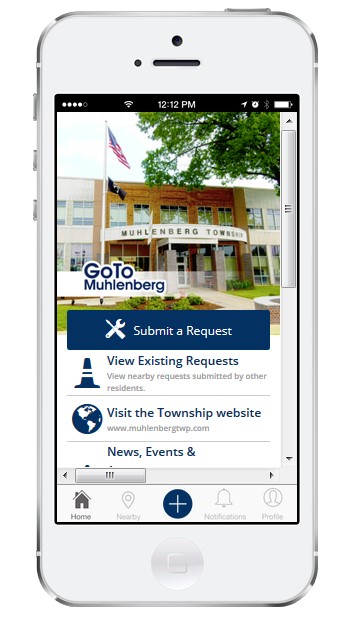
Recently, Muhlenberg Township, Pennsylvania, launched Accela Citizen Relationship Management (formerly PublicStuff), expanding its use of the Accela Civic Platform – the Township also uses Accela Finance and Administration to manage its complex finance and accounting processes.
Notably, the Township was able to launch Accela Citizen Relationship Management (CRM) in less than seven weeks. As a way to understand this successful launch, and hopefully provide lessons to those currently in the implementation stage (and others considering a CRM solution), I spoke with Joe Mench, Director of Information Technology for the Township.
Like many IT officials in local government, Joe wears many hats. Not only is he responsible for IT planning, but he also serves as business analyst, strategist and designer for the Township. In bringing Accela CRM to his community, Joe was involved in the purchasing and implementation of the product. (He’s also a citizen user – he lives in Reading, Penn., another Accela CRM customer, and submits requests and accesses information on Reading iRequest).
You recently launched Accela CRM in your community. What led you to purchase Accela CRM and what are your goals for the project?
I was put in contact with Dennis Kane (an Accela account executive), who facilitated a meeting with myself and Ken Cutroneo (an Accela business development executive). Ken worked quickly to get me setup with a team from Accela, and within a short period of time we were developing our goals and plans.
Our goal for the CRM was to create better workflows for requests for service and resident issues. The Accela CRM software was a perfect fit for us. Not only is it the most efficient way to get issues and problems solved, but its reporting functionality also yields useful data that helps with planning future projects and schedules for various workloads. You were able to implement Accela CRM in less than 7 weeks.
What are the main reasons for this turnaround?
The transition team from Accela made the process very easy for me. After our initial kickoff meeting, I had a clearly mapped out timeline and a specific set of goals. This helped me immensely for internal planning purposes. Regular check-ins and contact with Joe (Palladino, an Accela cloud delivery specialist) really were the key factors in meeting our timeline goals for live launch.
Can you describe your relationship with Joe? How did Joe facilitate training with you and your team?
Joe was awesome. Every concern I had was addressed and passed onto development in a timely manner throughout implementation. He was proactive during the whole process and made sure I was always kept in the loop for each phase of the project.
How were you able to incorporate other departments into the implementation process?
There was a lot of planning internally to make the implementation as seamless as possible. Before implementation even began, I had regular meetings with the Public Works Department, Customer Service, Engineering Codes & Zoning and the Parks Department to make sure we built the back end properly and made sure we captured every issue type we could before going live. Each department met with me and outlined their “wish list” for the app and we built on it from there. I explained the functionality and tools that Accela CRM would afford us, and we worked closely together to create issue types and workflows that worked well for each department.
How were you able to balance the need to focus on implementing Accela CRM with your other responsibilities?
For me, the implementation launch of the app really became the bulk of my focus for several weeks. If I had to give a percentage to my workload for the average day during that period, I would say that I spent about 60% of my day on Accela CRM and 40% on my other work duties. It was definitely high pressure to get the project up and running, but it was helped by having lots of pre-planning internally and by Accela helping me along the way with things that came up.
What advice would you give an agency about to begin implementation? Are there things they can do to make for a more efficient implementation process?
My biggest piece of advice would be to have a specific vision for what you want your CRM to do and be clear about your expectations and goals up front. If you do the legwork you need to do internally in your organization, it will make for a very easy implementation.
In my case, we also have the ability to do graphic design in house. For some agencies, design might be the one thing during the beginning stages that could hold them up. Look at the app and see what other communities have done. Get your inspiration there and have the basics like color, tone, feel and overall cohesive design elements picked out, or at least a general idea so you aren’t flying blind and panicking when you get to that stage of implementation.
[Interested in seeing some examples? Take a look here. For those without an in-house designer, Accela is happy to assist in this process.]
Beyond improving staff efficiencies and making it easier for citizens to connect with their government, how do you see Accela CRM benefiting operations in Muhlenberg?
We are already beginning to see the vast benefits that a properly implemented CRM can have for a township like Muhlenberg. Everything from staffing needs to project planning for the next fiscal year can benefit from the data you can gather with the GoTo Muhlenberg app and software.
For instance, staff needs can be evaluated in the Codes department because we can track and report on the amount of issues, the time it takes to complete them, when and where they are occurring.
In a specific case for us, we have a third-party trash hauler that removes residential trash and recycling. We can immediately see if one particular route is having repeated problems. Residents can upload photos of their trash problems (cans left in street, missed pickup, etc.) in real time and provide photo evidence that we can show to the trash hauler. This information will be invaluable when it comes time to negotiate a new trash hauling contract and could have a significant impact on terms, conditions and contract pricing.
Pothole reporting can show us where we have repeated issues and help to expedite road resurfacing when it comes time to plan the project schedule for the Public Works crew and their next calendar year. This also comes into play during budget time as well when we look at overall staffing, time spent on certain projects and where we are having our “hotspots” of issues within the Township.
Interested in learning more about Accela Citizen Relationship Management? Contact engagement@accela.com.



